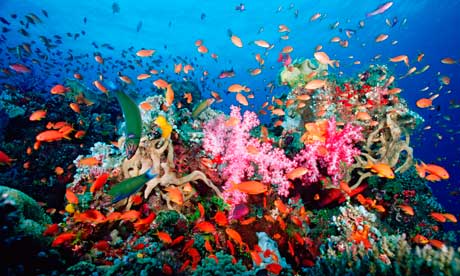Australia is hell-bent on destroying itself and everything around it. The new anti-science, pro-coal government is eagerly moving forward with plans to dump huge amounts of mining sludge right on the Great Barrier Reef and dredge a passageway through this incredible natural wonder to allow transport ships free access to a terminal at Abbot Point.
The huge deposits of coal in the Galilee Basin have everybody in the industry seeing dollar signs, and since externalities like environmental contamination and climate change don’t exist, there’s nothing in the way except some pesky coral-huggers.

And once the reef is dead, it’s going to stay dead, so what the hell. This is the ultimate nihilism of the fossil-fuel interests. And just as the oil extracted in Alberta’s Tar Sands is going to go to middle-Eastern interests, most of that Australian coal is headed somewhere else — in this case to China and India.
Approving just two of the coal mines in Queensland’s Galilee Basin, which would push coal through the dredged area at Abbot Point, would add emissions equivalent to six times the annual carbon footprint of the UK.
For the reef, it is not so much the risk of “death by a thousand cuts” but more “death by millions of cubic metres of sludge and billions of tonnes of carbon dioxide”. All approved.
The Great Barrier Reef is an amazing place. I have no doubt that the puritans in power would like to stamp this out:
For a few days each year, a vast area off the Queensland coast becomes an underwater city of sex witnessed by a growing number of divers and scientists eager to tick this bizarre spectacle off the nature lover’s ultimate bucket list.
(snip)
“It’s like this synchronized orgasm … like fairy dust going up in the water. It was amazing (and) I feel incredibly lucky to actually see (it) because a lot of people would have never seen it before.”
Coral spawning requires almost perfect tides, ideal weather and top temperatures to happen. It also occurs at night while the plankton feeders are asleep. When a big boulder coral goes off, it releases an underwater snow storm and hundreds of bundles float to the surface.
And it’s not hard to spot. There’s a slick on the surface and a pungent smell in the air.
Meanwhile the fish life sit on the bottom of the reef with distended stomachs from eating the eggs.
Like junkies, the world’s industrialized economies are desperate for a fix, and they don’t care what they steal or destroy on their way to a few moments of relief. I’m never going to visit the Reef in my lifetime, but that has nothing to do with my awareness of its value and beauty.
There are over 400 species of corals on the Great Barrier Reef. Together they provide the foundations of the greater structure of the Reef. Living within these corals are microscopic organisms called zooxanthellae that nourish the coral host through photosynthesis and give reef building corals both life and colour. They are the life-blood of a healthy coral reef.
However, corals and their zooxanthellae live in delicate balance with their environment. Even the smallest changes in water chemistry can cause the zooxanthellae to be expelled from the coral, leaving the coral skeletons looking white or bleached (coral bleaching). Unless conditions return to normal, usually within 4-6 weeks, the coral will die.
The important link between increasing sea temperatures and coral bleaching has been known for more than a decade. However, scientific research has recently identified that increasing levels of carbon dioxide in the atmosphere from rising emissions are exacerbating coral bleaching. The absorption of carbon dioxide into the ocean is a natural process but excessive amounts of carbon dioxide in the atmosphere are pushing ocean acidity levels well beyond normal. Unfortunately, even the smallest change in the acidity of the water is enough to stress corals, causing them to expel the zooxanthellae.
Coral bleaching events have been increasing in frequency over the last 20 years and are predicted to become still more frequent as water temperatures and carbon dioxide levels continue to rise.In summary, if we do nothing to stop climate change:
– by 2020: major coral bleaching affecting 60% of the reef will occur every 2 years
– by 2050: 97% bleached every year
– by 2080: catastrophic mortality of corals annually